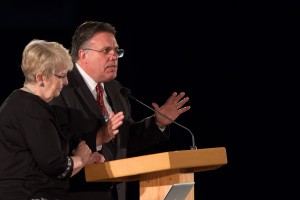More than 3,000 Women’s Conference participants filled the bleachers of the Smith Fieldhouse to listen to Brad Wilcox and Amy H. White address the power of grace during a Thursday afternoon session of Women’s Conference Thursday, May 1, 2014.

The popular Mormon boy band Beyond 5 performed a hymn at the beginning of the presentation. The audience perked up to catch the name of the group and listened intently to its rendition of “Come Thou Fount of Every Blessing.”
Wilcox and White began by defining grace. Wilcox told of a young girl who thought she must be perfect for Christ but later understood that she is perfected in Christ. Members of the church often misunderstand the concept of grace.
Wilcox explained that people need not to see a difference between Christ’s part and an individual’s part, but to see it as a relationship; covenant are the means to achieve such a relationship.
“A covenant is not a cold contract between partner A and B,” Wilcox said. “A covenant is a warm relationship between two friends who are on a first-name basis. It is that relationship that changes us forever.”
White explained to her audience that grace is every contact we have with Christ that enables us to change. She recounted the first time she felt grace. She had just arrived home from school and saw a television news report that showed a plane crash her father was involved in. She went to the bathroom and knelt down by the bathtub to pray. In her prayer she blamed herself for her father’s death.
“I started to explain to Heavenly Father that this was all my fault,” White said. “And finally I just stopped, and as soon as I stopped saying that prayer I was enveloped in this warmth and in this peace — it was so wonderful.”
White spoke about the difference between what those attending Women’s Conference ought to do and what is possible for them to do. She asked participants to turn to each other and say one thing they ought to do or ought to be. As the participants discussed with one another, White asked them how their conversation made them feel.
They ended their address inviting the participants to write their “oughts,” which are things one should be doing but can’t, down on a piece of paper, fold them up and then burn them. They urged participants to focus on the things they can possibly do, not what they ought to do.




